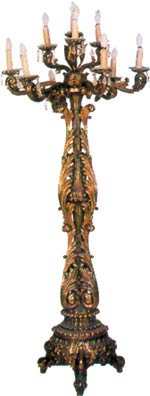Introduction
Freemasonry is a subject that has attracted much discussion for several centuries. Some have accused Masonry of fantastic crimes and misdeeds. Instead of trying to understand "the Brotherhood," and criticizing it objectively, critics have been unduly hostile to the organization. For their part, Masons have deepened their traditional reticence in the face of these accusations, preferring to present themselves as an ordinary social club—which they are not.
This book contains a correct exposition of Masonry as a school of thought. The most important unifying influence among Masons is their philosophy—which can be best described according to such terms as "materialism" and "secular humanism." But, it is an errant philosophy based on false suppositions and flawed theories. This is the basic starting-point from which Masonry must be criticized.
 |
 |
It is necessary to point out from the start that such criticism is important, not only to inform non-Masons on the subject, but also to invite Masons themselves to see the truth. Of course, Masons, like everyone else, are free to choose for themselves, and can adopt whatever worldview they wish and to live in accordance with it. This is their natural right. But, others also have a right to expose their errors and to criticize them, and this is what this present book attempts to do.
We follow the same approach in our criticisms of other communities as well. Like the Jews for example. This book, in part, also deals with the history of Judaism and offers certain important criticisms. It must be pointed out that these have nothing to do with anti-Semitism or "Judeo-Masonic" conspiracy theories. Indeed, anti-Semitism is alien to a true Muslim. Jews are a people that at one time had been chosen by Allah and to whom He sent many prophets. Throughout history they suffered much cruelty, even being subjected to genocide, but they never abandoned their identity. In the Qur'an, Allah calls them, together with Christians, the People of the Book, and enjoins Muslims to treat them kindly and justly. But, a necessary part of this justice is to criticize the errant beliefs and practices of some of them, to show them the path to true righteousness. But of course, their right to live according to what they believe in and desire is beyond question.
Global Freemasonry sets out from this premise, and investigates critically Masonry's roots, as well as its aims and activities. In this book, the reader will also find a summary of the history of the Masons' struggle against the morality of theistic religions. Freemasons have played an important role in Europe's alienation from religious moral values, and in their place, founding of a new order based on the philosophies of materialism and secular humanism. We will also see how Masonry has been influential in the imposition of these dogmas to non-Western civilizations. Finally, we will discuss the methods Masonry has used to help establish and perpetuate a social order based on these dogmas. Their philosophy and the methods they use to establish this philosophy will be exposed and criticized.
In examining the atheist, Darwinist and materialist philosophy of Freemasonry, quotations from Masons' own reference works have been included. The reason for the inclusion of these expressions, which are incompatible with respect for Allah, the prophets, angels, holy scriptures and religious moral values, is that they represent important evidence revealing the true face of Freemasonry. Surely Allah, His holy messengers, the angels, holy scriptures and all spiritual values are beyond the expressions employed in such extracts.
It is hoped that the important facts related in this book will be a means whereby many, including Masons, will be able to look at the world with better awareness.
After reading this book, the reader will be able to consider many subjects, from schools of philosophy to newspaper headlines, rock songs to political ideologies, with a deeper understanding, and better discern the meaning and aims behind events and factors.
- Preface
- An Important Statement about Judaism, Zionism and Freemasonry
- Introduction
- I. From the Templars to Ancient Egypt
- II. The Inside Story on the Kabbalah
- III. Humanism Revisited
- IV. Materialism Revisited
- V. The Theory of Evolution Revisited
- VI. The Masonic War Against Religion
- Conclusion
- The Deception of Evolution
